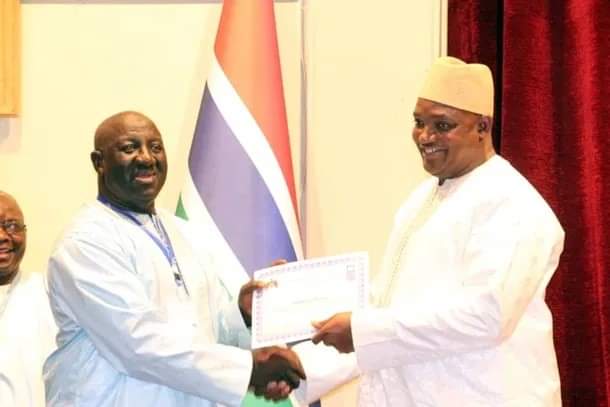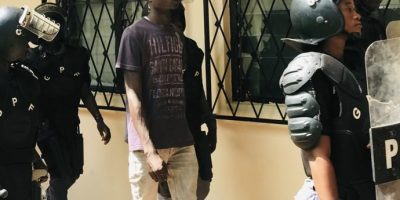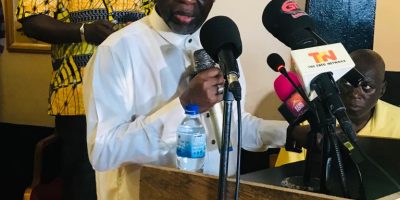 Alagi Yorro Jallow.
Alagi Yorro Jallow.
The state of insecurity in the Gambia is very grave. Very dire and frightful with increasing the threats to internal security, armed robbery, and organized banditry latest security challenges.
Part III.
Mamudu: The current challenges of insecurity that have bedeviled the Gambia are undoubted of great concern to all well-meaning Gambians. What started as a growing bandit industry overwhelmed by armed robbers to rising insecurity disguised as banditry concern has now become ubiquitous in every part of the country.
Today, the level of criminality being perpetrated daily across the country through acts of terrorism, banditry, kidnapping, and armed robbery is alarming. In a deplorable state of security in the country, notably, the unprecedented increase in violent attacks defies the sustained narratives amongst security experts.
The resultant loss of innocent lives and property is unprecedented; therefore, not acceptable by any global standard. The danger looming over our nation is real and palpable. With criminals, bandits, armed robbers, and sundry other criminals seizing the national landscape and terrorizing our country, it is no surprise that many are fast losing hope in the capacity of the Gambia to muddle through this time, as we did in such moments in the past.
Medieval theologian St. Thomas Aquinas exhaustively treated this matter of “unequal relationship between equals.” He professed that obedience is commanded within the limits of due observance. He also noted that wiser and righteous should have command over the rest of the nation would stand. He said authorities that are defective either in their origins or in their exercise should be disregarded. That is what is happening between President Adama Barrow, his presidency, and his government. Adama Barrow was elected for a purpose; now that his regime represents the opposite of the reason for his authority, he loses the scepter. That gives the contextual foundation for the current engagement of the armed robbers. So many mistakes have been made; several lessons have been learned, several have been unlearned and learned again.
Mamudu: Time is fast running out for all of us. There is an alarming state of insecurity without a vast, growing crowd of victims. Only the wise would see what that portends and act. The ship of freedom has set sail in the Gambia. Justifiable resistance to the evil of domination is an act of faith. That is the philosophical basis for the repeated demand for security sector reform and the restructuring of Independent institutions.
Moreover, it is foolish to think that those opposed to the perfidy of today’s Gambia merely seek to supplant the incumbent. This is not about the bumbling individual complicity sleeping on duty while armed robbers, bandits, and criminals, eat the neighbors’ barns. This is about defeating the odious unitarism that has wrecked the ship of everybody. The alternative to an immediate truly the Gambia is Somalia of 1991-date; or Myanmar of 2021. The choice is ours to make.
In one village was an all-knowing legend who had answers for every question and solutions to every problem. However, in this village, a small boy took delight in confounding people, and he was determined to demystify the legend. One morning, the small boy went to the older adult with his hands clasped behind his back, holding a live chick. “I hope there is no problem, my boy,” the old man asked on sighting the boy. “No problem, Sir,” replied the boy, “but I am here to put your knowledge to test. I am holding a chick in my hands, and I want you to tell me whether it is alive or dead.”
The plan was that if the older man said it was alive, he would squeeze the chick dead before presenting it, and if he said it was dead, the boy would then present it alive. However, the older man was wise to the plot. Smiling, he said: “whether the chick is alive or dead is a simple problem, my son. The answer is in your hands.”
Mamudu: The message from the legend is simple to grasp in the context of what ails our country today. Whether we have a united Gambia where citizens can maximize their potential regardless of where they come from or retreat to the Hobbesian state where citizens begin to look for ‘Plan B’ as a way of escape from self-inflicted tragedies, President Adama Barrow is the master of our collective destiny: The answer is now in his hands.
Who are we to blame? When burglars feel so emboldened as to make ‘foolish attempts’ within the precincts of the Greater Banjul area and robbed in the home of a Supreme Court Justice. However, whatever may be the situation in the country, the reality is that only a tiny elite has the opportunity and resources for ‘Plan B.’ For the vast majority of our people, there is no place to run.
The security challenge in the Gambia is, of course, mind-boggling. What compounds the problem is the failure of leadership that has ensured what divided us more when we should all rally to confront our common enemy. Noteworthy is our observation that the incursion of armed robbers, criminals, and bandits into the Greater Banjul area part of the country has presented a severe security challenge such that citizens are not able to live their everyday lives, including pursuing various productive activities leading to a threat to food supply and general security.
Mamudu: Unfortunately, the discordant tunes and actions that have accompanied heightened incidences of insecurity in different parts of the country have exposed our susceptibility to centrifugal forces of regionalism, ethnicity, partisan politics, and religion. The unnecessary tension this has generated in the polity portends danger for our country’s peace, unity, and corporate existence. This can only serve the evil agenda of those who do not mean well for our country in every sense. This is an anxious moment for the Gambia.
However, the lack of a rallying figure makes the banditry and crisis of public safety dangerous in the Gambia. The prevalence of banditry in the country appears to have been high and rising over the years. Crimes against persons, including murder, rape, and armed robbery, have grown on a large scale and viciousness in the Gambia. This has been demonstrated by the pervasive trend of armed robbery in the country, which mirrors Africa-wide experiences.
President Adama Barrow is expected to be the captain of the ship. That ship is now in severe turbulence when the chief re-assurer of the nation faces citizens in perpetual doubt. For all the reasons above, the Gambia is increasingly ungovernable. The state of insecurity in the Gambia is very grave. Very dire and frightful. Our citizens are not safe. Both the people and the government know this, and we are losing live and properties. We are losing our humanity. Why do partisans engage in deliberate falsehood in the face of emerging factual clarifications? Whom do we believe now? Are our journalists in the print and electronic media or the veritable “newscasters” on Facebook and other social media?
The country has become a theatre of conflict and insecurity. Anarchy seems to be shaping the country’s character, with armed robbery, banditry, and criminalization. On the one hand, bandits calling the shots in the country wreaking havoc in the entire country. This amorphous conglomerate of conflict entrepreneurs maim, kill, ransack people’s houses at will, steal, and killing people. With a burgeoning population, decreasing earnings, entrenched corruption, deep divisions in the polity, and growing political intolerance, it is not difficult to see how the Gambia found itself in this cauldron of insecurity armed robbery.
Mamudu: Security and safety-wise, we are in a natural but undeclared state of emergency! Several events in the country have left many wondering about morality and security in the Gambia. Lives are increasingly becoming cheap, as several occurrences are making many ponder. People are killed with impunity. There appears not to be justice for the oppressed across the country; ritualists and bloodthirsty animals are having a field day. It is now so bad that there is no day that the reports about criminal activities do not make the headlines. Yes, there are crimes everywhere across all continents, but the Gambia’s color of crimes seems too choking and bizarre.
The crime rate is gradually becoming a trend that all hands have to check the trend. It is like there is a demon roving around seeking blood. Men and women of conscience appear helpless. Everyone has suddenly become interested in ‘money and material things at all costs’ syndrome. In the Gambia, it seems no one bothers to know what one does because all that matters is money and ostentation. The craze for money is also traceable to several criminal activities in the country. Some of the proponents of ‘show-off’ are all over social media. They have no known source of income but terrorize society with state-of-the-art cars and imposing edifices. A hustler with legitimate means is thus derided as lazy and provokes insult contemptuously.
The problem is that life has become so cheap in the Gambia that many persons take laws into their own hands. The details of criminal activities, as narrated in several reports based on police disclosure, were gory. An eavesdropper cannot fathom what could make the man embark on such a callous act. However, one thing is sure: Nothing can justify such a wicked act.
Mamudu: Like many other well-intentioned creations before it, insecurity threat and vandalism have successfully heightened violent crimes until impunity percolated its ranks, and the armed robbery became a racket and a criminal enterprise. It is not surprising that the Gambia’s spent leadership, long used to arbitrariness, reinforced by the legacy of dictatorship and at the limit of its own possibilities, following evidence of the social failure of the Gambian society. It felt like the revenge of the poor.
Anarchy looms in the Gambia because insecurity has prevented people from productive, leading to a steep drop in production. This has led to a spike in food prices and escalating hunger. In addition, the rise in banditry has decimated capital, as families scramble to withdraw their savings for personal security. The crisis predates President Adama Barrow’s administration, and his government’s reaction to it has been tepid at best.
The war against bandits, criminals, and robbers in the Gambia has become unfinished business; nevertheless, as is the case in the Greater Banjul Area, the contemporary spate of vandalism and the destructive aftermath linked to banditry and armed robbery begs attention, mainly the contours, trends, and trajectory of armed robbery in the Gambia has responded to the threats it poses. There is no framework or any institutional processes for accountability. Those involved are in no hurry to end a profitable business venture. Everywhere you turn, there seems to be a game plan to induce war. For a deformed post-colonial state, or in the case of the Gambia, a “semi-democracy” in the churlish observation of The Economist, the incursion of a security complex can prove catastrophic.
Mamudu: After all, for democracies, conflicts come at a cost, and the very nature of conflicts erodes the efficacy of civil society. Since there is no support in national institutions, Gambians seek support elsewhere, particularly in ethnicity and religion. Traditional forms of Islam and Christianity are being displaced by new religious movements with a heavier focus on purity and proselytization, furthering weakening the national fabric.
Mamudu: Avoiding a descent into complete anarchy will require a great deal of political will and cooperation, of the sort that has been rare among the Gambia’s ruling classes. If that is not possible at the national level, perhaps the best hope for the Gambia is a system of increased adherence to the rule of law and empowered to solve problems that national elites have failed to solve, to provide the security that national elites and the Gambia Police Force have failed to deliver.




Ma sha Allah great and thanks for sharing